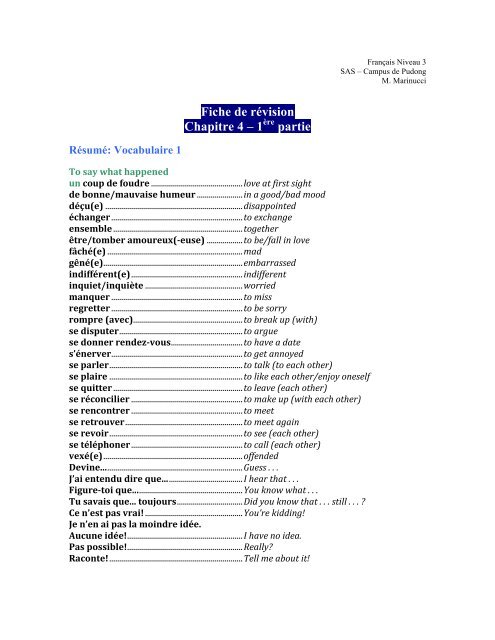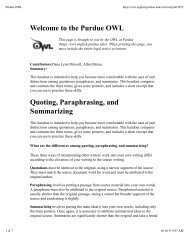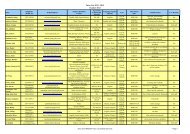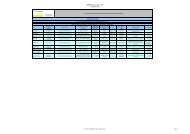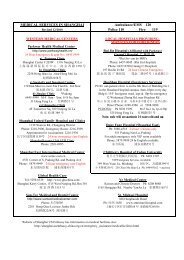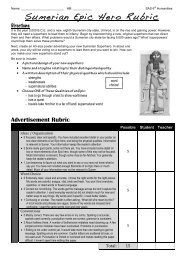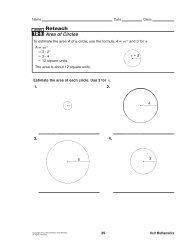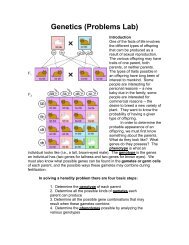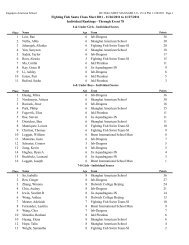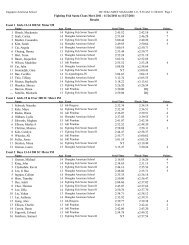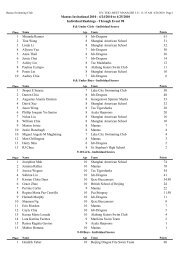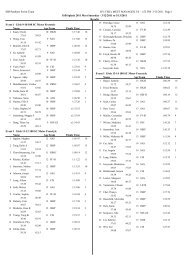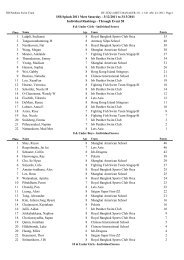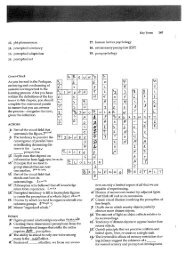Fiche de révision Chapitre 4 – 1ère partie
Fiche de révision Chapitre 4 – 1ère partie
Fiche de révision Chapitre 4 – 1ère partie
You also want an ePaper? Increase the reach of your titles
YUMPU automatically turns print PDFs into web optimized ePapers that Google loves.
Résumé: Vocabulaire 1<br />
<strong>Fiche</strong> <strong>de</strong> <strong>révision</strong><br />
<strong>Chapitre</strong> 4 <strong>–</strong> 1 ère <strong>partie</strong><br />
To say what happened<br />
un coup <strong>de</strong> foudre ..............................................love at first sight<br />
<strong>de</strong> bonne/mauvaise humeur .......................in a good/bad mood<br />
déçu(e) .....................................................................disappointed<br />
échanger..................................................................to exchange<br />
ensemble.................................................................together<br />
être/tomber amoureux(-euse) ..................to be/fall in love<br />
fâché(e) ....................................................................mad<br />
gêné(e)......................................................................embarrassed<br />
indifférent(e)........................................................indifferent<br />
inquiet/inquiète .................................................worried<br />
manquer ..................................................................to miss<br />
regretter ..................................................................to be sorry<br />
rompre (avec).......................................................to break up (with)<br />
se disputer..............................................................to argue<br />
se donner ren<strong>de</strong>z-vous....................................to have a date<br />
s’énerver..................................................................to get annoyed<br />
se parler...................................................................to talk (to each other)<br />
se plaire ...................................................................to like each other/enjoy oneself<br />
se quitter .................................................................to leave (each other)<br />
se réconcilier ........................................................to make up (with each other)<br />
se rencontrer ........................................................to meet<br />
se retrouver...........................................................to meet again<br />
se revoir...................................................................to see (each other)<br />
se téléphoner........................................................to call (each other)<br />
vexé(e)......................................................................offen<strong>de</strong>d<br />
Devine.......................................................................Guess . . .<br />
J’ai entendu dire que........................................I hear that . . .<br />
Figure-toi que.......................................................You know what . . .<br />
Tu savais que... toujours.................................Did you know that . . . still . . . ?<br />
Ce n’est pas vrai!.................................................You’re kidding!<br />
Je n’en ai pas la moindre idée.<br />
Aucune idée!..........................................................I have no i<strong>de</strong>a.<br />
Pas possible!..........................................................Really?<br />
Raconte!...................................................................Tell me about it!<br />
Français Niveau 3<br />
SAS <strong>–</strong> Campus <strong>de</strong> Pudong<br />
M. Marinucci
To ask for and give advice<br />
Qu’est-ce que tu en penses?..........................What do you think about it?<br />
... à ma place? ........................................................ . . . in my place?<br />
À ton avis, ... ...........................................................In your opinion . . .<br />
D’après toi, ............................................................In your opinion . . .<br />
... tu ferais mieux <strong>de</strong>.......................................... . . . it would be better to . . .<br />
Si j’avais été toi, ..................................................If I had been you . . .<br />
Pas nécessairement. .........................................Not necessarily.<br />
Surtout pas! ...........................................................Certainly not!<br />
Jamais <strong>de</strong> la vie!...................................................Not in a million years!<br />
Verbes réciproques<br />
In English actions that involve two or more people doing something for eachother are<br />
reciprocal actions. These mutual actions can be seen in the expressions each other<br />
and one another.<br />
Sean and Lori like each other. Randy and Madison help one another with their<br />
homework.<br />
If the meaning is clear enough, you don’t have to say each other. In the sentence<br />
below, who will speak to whom is obvious, so you could leave out to each other.<br />
Let’s talk (to each other) on the phone tonight.<br />
Because the reciprocity of action verbs takes place between several people or things,<br />
these verbs are necessarily plural.<br />
In French reciprocal verbs use some of the same pronouns as reflexive verbs: se,<br />
nous, and vous. These pronouns are plural and generally mean each other.<br />
Nous nous aimons. We love each other. Il se sont rencontrés hier. They met each<br />
other yesterday.<br />
In the passé composé, reciprocal verbs take the helping verb être. When a verb takes<br />
a direct object (COD), the past participle agrees with the pronoun.<br />
Ex: Elles se sont vues à la gare.<br />
When a verb takes an indirect object (COI), the past participle does not agree with<br />
the pronoun. Some verbs that take indirect objects are conseiller, <strong>de</strong>man<strong>de</strong>r, dire,<br />
écrire, offrir, parler, plaire, and téléphoner.<br />
EX: Elles se sont téléphoné hier. Nous nous sommes parlé la semaine <strong>de</strong>rnière.<br />
CONDITIONNEL PASSÉ<br />
In English the past conditional consists of would plus the past infinitive (have+ past<br />
participle). It serves to express missed opportunities and hypothetical situations.<br />
He told me that he would have liked to come to the party. In your place, I would<br />
have done the same thing.<br />
The past conditional is often found in hypothetical sentences with if. When if is<br />
followed by the past perfect, the conditional past is used in the other clause that
states the result.<br />
If I had had the time, I would have done my homework. Would you have stayed at<br />
home if it had rained yesterday?<br />
In French the pastconditional consists of the conditional of the helping verb (avoir<br />
or être) and the past participle of the main verb. The past conditional is used to talk<br />
about conditions in the past that could have taken place in the past, but did not.<br />
Ex: Tu aurais pu m’ai<strong>de</strong>r!<br />
The past conditional is also used to state the result in a hypothetical situation taking<br />
place in the past. The plus-que-parfait (past perfect) is used in the si clause, and the<br />
past conditional is used in the result clause.<br />
Ex: Si nous avions vu les Renaud, nous leur aurions parlé.<br />
J’aurais finis mes <strong>de</strong>voirs si j’avais eu le temps.<br />
Ils se seraient réconciliés s’ils s’étaient parlé.<br />
N’oubliez pas <strong>de</strong> lire les p.144 et 145 sur le nouveau co<strong>de</strong> <strong>de</strong> la famille au Maroc et sur<br />
les habitu<strong>de</strong>s <strong>de</strong>s jeunes Français lorsqu’ils sortent avec leur copine (copain).


